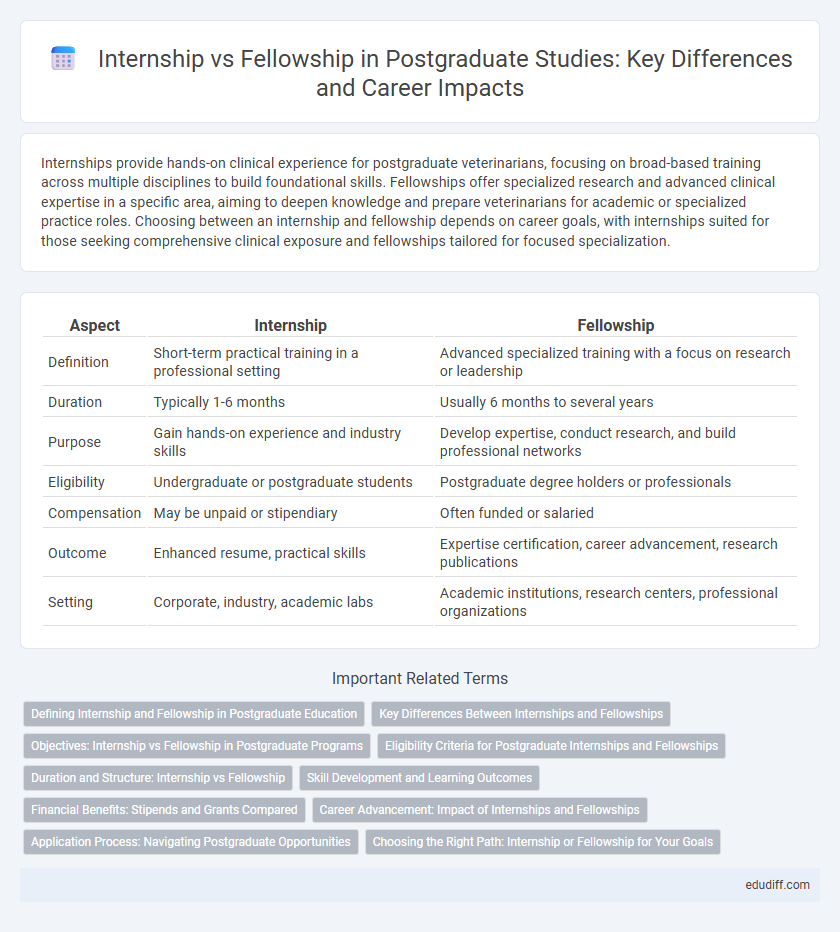Internships provide hands-on clinical experience for postgraduate veterinarians, focusing on broad-based training across multiple disciplines to build foundational skills. Fellowships offer specialized research and advanced clinical expertise in a specific area, aiming to deepen knowledge and prepare veterinarians for academic or specialized practice roles. Choosing between an internship and fellowship depends on career goals, with internships suited for those seeking comprehensive clinical exposure and fellowships tailored for focused specialization.
Table of Comparison
| Aspect | Internship | Fellowship |
|---|---|---|
| Definition | Short-term practical training in a professional setting | Advanced specialized training with a focus on research or leadership |
| Duration | Typically 1-6 months | Usually 6 months to several years |
| Purpose | Gain hands-on experience and industry skills | Develop expertise, conduct research, and build professional networks |
| Eligibility | Undergraduate or postgraduate students | Postgraduate degree holders or professionals |
| Compensation | May be unpaid or stipendiary | Often funded or salaried |
| Outcome | Enhanced resume, practical skills | Expertise certification, career advancement, research publications |
| Setting | Corporate, industry, academic labs | Academic institutions, research centers, professional organizations |
Defining Internship and Fellowship in Postgraduate Education
Internships in postgraduate education are structured, supervised work experiences allowing students to apply theoretical knowledge in practical settings while developing professional skills. Fellowships typically involve advanced research or specialized training, often funded, aimed at deepening expertise and contributing to academic or professional fields. Both internships and fellowships are essential for career development, but internships emphasize skill application, whereas fellowships prioritize scholarly or professional specialization.
Key Differences Between Internships and Fellowships
Internships typically offer short-term, hands-on work experiences primarily designed for students or recent graduates to gain practical skills and industry exposure. Fellowships often involve more specialized, research-oriented, or leadership development opportunities with a longer duration, targeting advanced postgraduate individuals or early-career professionals. Key differences include the level of responsibility, duration, compensation, and the focus on academic or professional advancement in fellowships compared to skill acquisition and exploration in internships.
Objectives: Internship vs Fellowship in Postgraduate Programs
Internships in postgraduate programs primarily aim to provide practical work experience and industry exposure, enhancing professional skills and career readiness. Fellowships emphasize advanced research, specialized training, and academic development, often supporting candidates in producing significant scholarly contributions. Both pathways serve distinct objectives, with internships focusing on applied learning and fellowships prioritizing knowledge creation and expertise expansion.
Eligibility Criteria for Postgraduate Internships and Fellowships
Postgraduate internships typically require candidates to have completed a relevant graduate degree or be in the final stages of their program, demonstrating foundational knowledge and practical skills in their field. Fellowships generally demand a higher level of academic achievement, often requiring candidates to hold a completed postgraduate degree with a strong research background or professional experience related to the fellowship's discipline. Eligibility criteria for both opportunities emphasize academic excellence, relevant coursework, and sometimes specific competencies or certifications depending on the specialization.
Duration and Structure: Internship vs Fellowship
Internships typically span a few weeks to several months and offer structured, hands-on experience with defined tasks under close supervision. Fellowships generally last from six months to multiple years, emphasizing advanced research or professional development with greater autonomy and specialized projects. Both programs provide critical skill-building opportunities but differ significantly in length and the depth of expertise cultivated.
Skill Development and Learning Outcomes
Internships provide hands-on experience by immersing postgraduate students in real-world work environments, enhancing practical skills and industry-specific competencies. Fellowships emphasize advanced research capabilities, critical thinking, and specialized knowledge development through structured mentorship and scholarly activities. Both pathways contribute uniquely to skill development, with internships fostering applied expertise and fellowships cultivating academic and professional growth.
Financial Benefits: Stipends and Grants Compared
Internships typically offer stipends that cover basic living expenses and may range from unpaid to moderate amounts depending on the industry and location, while fellowships generally provide more substantial financial support through grants designed to cover tuition, research costs, and a living stipend. Fellowships often include dedicated funding for conference travel and materials, enhancing the overall financial package beyond the standard internship stipend. The financial benefits of fellowships usually surpass those of internships, making them more attractive for postgraduate students seeking comprehensive support during advanced study or research projects.
Career Advancement: Impact of Internships and Fellowships
Internships provide hands-on experience that enhances practical skills and builds professional networks, crucial for early career development in postgraduate studies. Fellowships offer focused research opportunities and funding, allowing deeper expertise and academic recognition, which significantly boost career prospects in specialized fields. Both internships and fellowships are strategic pathways for career advancement, with internships emphasizing skill acquisition and fellowships supporting scholarly growth.
Application Process: Navigating Postgraduate Opportunities
The application process for postgraduate internships typically involves submitting a resume, cover letter, and possibly academic transcripts or letters of recommendation, emphasizing relevant skills and experience. Fellowship applications often require a more comprehensive submission, including a research proposal or statement of purpose, demonstrating alignment with the fellowship's goals and objectives. Understanding specific requirements and deadlines is crucial to successfully navigating these postgraduate opportunities.
Choosing the Right Path: Internship or Fellowship for Your Goals
Selecting between an internship and a fellowship depends on your postgraduate goals and career trajectory. Internships often provide hands-on experience and skill development within specific industries, ideal for exploring various fields and building professional networks. Fellowships focus on advanced research, leadership, and specialized expertise, suitable for those committed to deepening knowledge or pursuing academic and policy-oriented careers.
Internship vs Fellowship Infographic

 edudiff.com
edudiff.com